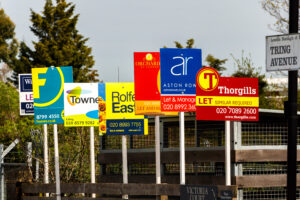
The housing market has enjoyed a delayed spring boost, with sales prices rising at the highest rate so far this year as mortgage rates ease.
The average price of properties sold in Britain hit a record £372,894 this month, according to Rightmove, a 1.8 per cent increase, or £6,647, on April and ahead of a historic average rise in May of 1 per cent. Prices were also 1.5 per cent higher than they were in the same month last year.
The largest monthly increases in asking prices were in London and the southeast, up by 2.8 per cent and 2.3 per cent, respectively. The average house price in the capital hit £696,477. Northeast England remained the cheapest region, where prices fell by 2.3 per cent to £179,693.
The discount from final asking price to agreed sale price has steadied at a nationwide average of 3.1 per cent, in line with normal market levels. Agreed sales numbers remain 3 per cent behind the pre-pandemic level in 2019.
Tim Bannister, Rightmove’s director of property science, said: “This month’s strong jump in new seller asking prices looks like a belated reaction and a sign of increasing confidence from sellers, as we’d usually see such a big monthly increase earlier in the spring season.”
He suggested one reason for rising confidence may be an easing of previously gloomy predictions for the market. He also said it was more likely that the market would continue to move towards a more normal level of activity this year after the exceptional business conducted during the pandemic, when stamp duty breaks turbo-charged demand.
The record numbers defy warnings that higher interest rates, which translate to more expensive mortgages, and the rising cost of living will cause a sharp slowdown in the housing market.
Confidence has been helped by a reduction in mortgage borrowing costs from the highs reached in the aftermath of last September’s mini-budget. Despite another increase in the base rate to 4.5 per cent, the average rate for a five-year fixed mortgage for homebuyers with a 15 per cent deposit was 4.52 per cent last week, down from 5.89 per cent in October. Investors expect only one more increase from the Bank of England this year before rates start to fall.
Bannister said: “Steadying mortgage rates and a generally more positive outlook for the economy are also contributing to more seller confidence, though there are likely to be more twists and turns to come.” He said the market was still very price-sensitive and sellers should not damage their prospects by overpricing initially.
Capital Economics, the consultancy, estimates that prices could drop by 20 per cent from the 2021 peak, but only if mortgage rates stay at 5 per cent for at least another 18 months. Experts say it is more likely that rates will come down as the economy slows, leading to overall housing price falls of between 10 per cent and 12 per cent from the average recorded in 2021.
Read more:
House prices start to see a spring boost





